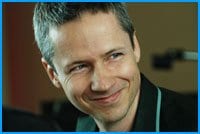
BELLES-LETTRES. "Queer writing communities support their own so beautifully," says writer Michelle Tea. Credit: (Robin)
As someone who is likely best known for his achievements in theatre and film, actor and filmmaker John Cameron Mitchell may seem a wildcard choice for Toronto’s Writing Outside the Margins, the queer literary festival presented by Xtra.
Mitchell is perhaps best known as the writer, director and star of the Broadway hit turned feature film sensation Hedwig and the Angry Inch. The twisted fictional rock bio-pic, featuring music and lyrics by Stephen Trask, won best director and audience awards at the Sundance Film Festival in 2001 (if you haven’t already seen it, shame on you, go rent it right now). It also garnered Mitchell rave reviews for his performance as the infamous, Farrah Fawcett-wigged, glittery rock ‘n’ roller Hedwig (Mitchell received a Golden Globe nomination for best actor). More recently Mitchell grabbed headlines and acclaim as the creator and director of Shortbus, a film that neatly demolishes the divide between mainstream film and pornography. With an eclectic ensemble cast, including Toronto talents Sook Yin Lee and Gentleman Reg, Shortbus, which was created out of an extensive two-year development process involving the cast, features both a heartfelt storyline as well as a series of explicit (and aerobic) sex scenes. It is the ultimate in human drama and heavy breathing.
As a literary fest headliner Mitchell brings to the mix something that’s often ignored and yet still vital to queer culture: the screenplay. Like the playwright, the screenplay writer is a master of metaphor and description, not to mention dialogue. The unfortunate part is that the majority of this work goes unrecognized, largely because so few people get to see it in print.
Would there be a significant audience for this body of work, for the scripts of both beloved films like Torch Song Trilogy as well as work that was not produced? “It would be an amazing idea,” says Mitchell from his apartment in New York, “to have a collection of unproduced screenplays published… of things that are impossible to make.”
Having written for theatre and screen, Mitchell has considered publishing something novel-like. Possibly this would involve adapting one of his screenplays, an option that would allow him to pursue ideas without worrying about the complexity of reproducing them on screen. At the same time, moving into print would have its downsides for Mitchell, who relishes the “joy of collaboration” involved in filmmaking. “When elements come together and form a compound,” he says, referring to the combination of artists involved in filmmaking, “that’s important to my process.”
Hearing reactions to screenings, getting notes, Mitchell adds, are all essentials to the creative process that novelists often don’t have access to on the same level as filmmakers.
Mitchell will get to enjoy liberal doses of this kind of audience feedback to the written word when he appears on stage at Writing Outside the Margins. Mitchell’s set list, at the time of our interview, is still a work in progress, including some material from a screenplay as well as some work from other writers Mitchell greatly admires. One prospect is the writing of a “troubled young author” who passed away before his work could be published, whose writing Mitchell is in the process of trying to get out there. Mitchell is also considering performing a scene from a play by Tony Kushner, Only We Who Guard the Mystery Shall Be Unhappy, in which soon to be ex-First Lady Laura Bush reads to dead Iraqi children. Mitchell, who has expressed his lack of desire to resume acting post Hedwig, noted that the play, and the overall brilliance of Kushner, “makes me want to act again.”
Perusing his bookshelves he lists off some of his favourite classic queer writers (among them Oscar Wilde, James Baldwin, Noel Coward and William Burroughs, who Mitchell describes as a writer who has “gone into the depths and come out with something truly original and funny”). Then he notes this particular kind of festival is not something he does often but it’s certainly something he enjoys taking part in. “I think [a queer literary festival] is a great idea,” he says. He’s looking forward to meeting up with queer artists including US author Michelle Tea (see page 31), whom he has previously encountered at New York events like Homo à Go-go.
Prior to his performance at Writing Outside the Margins, Mitchell will DJ with fellow queer filmmaker Bruce LaBruce at the fest’s Saturday night opening party at Alibi. The last time the two performers DJed together they were in the “Alternative Rainbow” room at a Pride (aka Rainbow) event in Istanbul. It appears that even when Mitchell’s rockin’ the rainbow, he’s rockin the alternative rainbow. “To some people I’m considered mainstream,” Mitchell says, “and that’s fine.”
Discussing his breakthrough flick Hedwig, which received funding from New Line Cinema (financier of both the super mainstream Lord of the Rings as well as John Waters’ far less mainstream flick A Dirty Shame), Mitchell suggests that the film’s alternative status may have had everything to do with timing. “At another time,” even an earlier period such as the 1970s, “Hedwig could have been a Hollywood movie.”
Although Mitchell can clearly identify himself as an outsider in terms of the queer subject matter of his films or, more specifically, his frank, unclouded, treatment of sex and sexuality, he also views himself as something of a traditionalist, a fan of clear narratives and good stories. In a way, Mitchell may be best described as an alchemist who prides himself on bringing together the traditional and mainstream with the alternative. Rather than being “willfully contrarian” with his work, Mitchell says he endeavours to “use stuff that I know works, and add stuff that might be a little more surprising and cause you to think a little deeper than with traditional Hollywood films.” He sees himself situated “on the border between the alternative and the mainstream,” but his focus is on making work “that is truly entertaining but truly challenging.”
Mitchell’s next project, which is still under wraps, is “definitely a Hollywood production,” he says, “a kind of comedy like you would find in the ’70s mainstream.” He is currently grappling with one particular element of Hollywood film, the inclusion of the requisite “big name” celebrity, which he has up until this point largely avoided with ensemble casts of friends and what might be described as smaller name actors. Although calmly mum on the subject matter and content of the film, Mitchell did hint that the comedy would be in line with films by Woody Allen. Audiences could be in for Mitchell’s twist on Annie Hall, which I personally think could be pretty fantastic.
In the meantime the smart queers will be at Writing Outside the Margins on Aug 24 to check out Mitchell’s performance which, whatever it may include (plays, poetry, screenplays, what-have-you), promises to be stellar, if Mitchell’s past work is any indication.

 Why you can trust Xtra
Why you can trust Xtra


